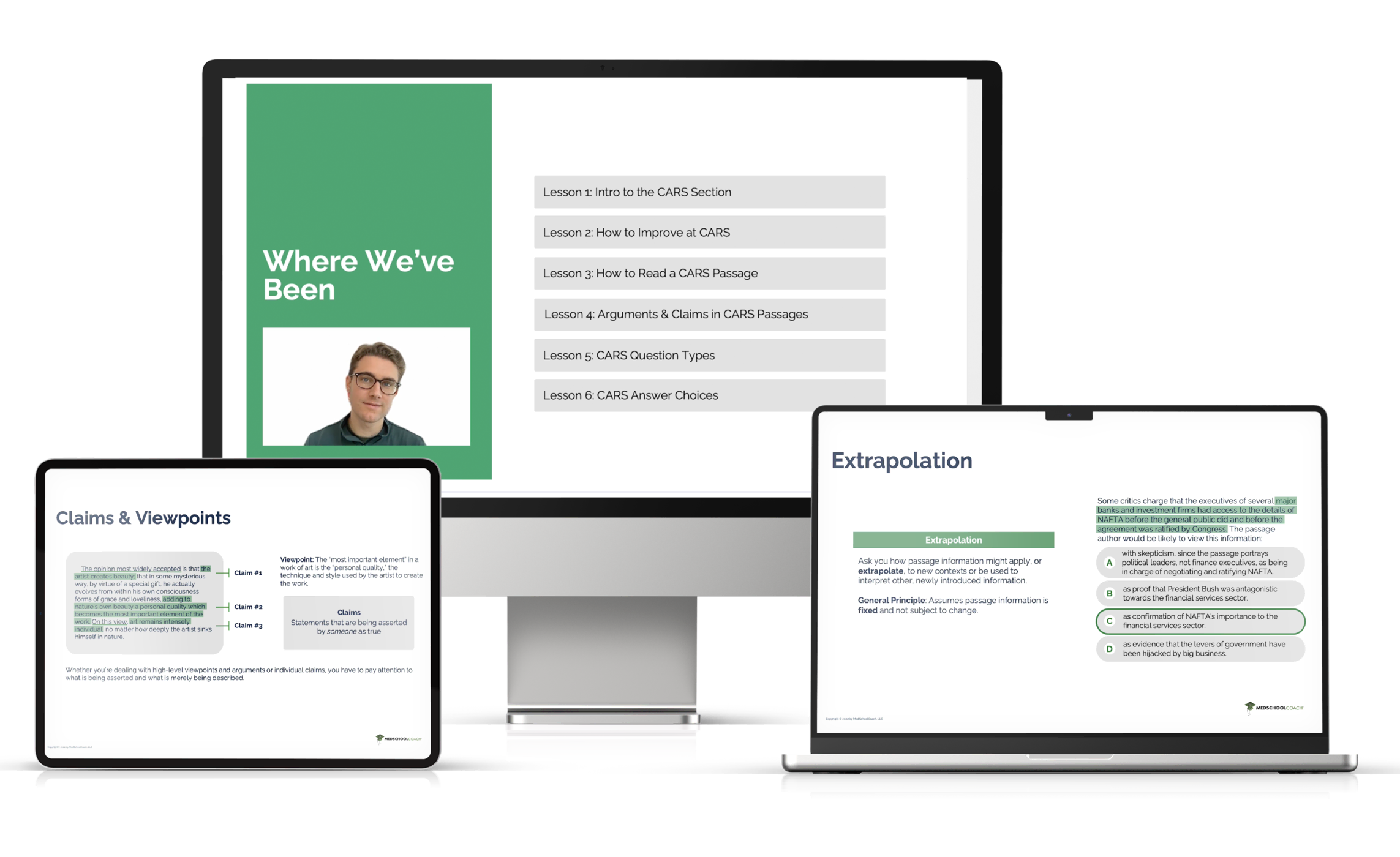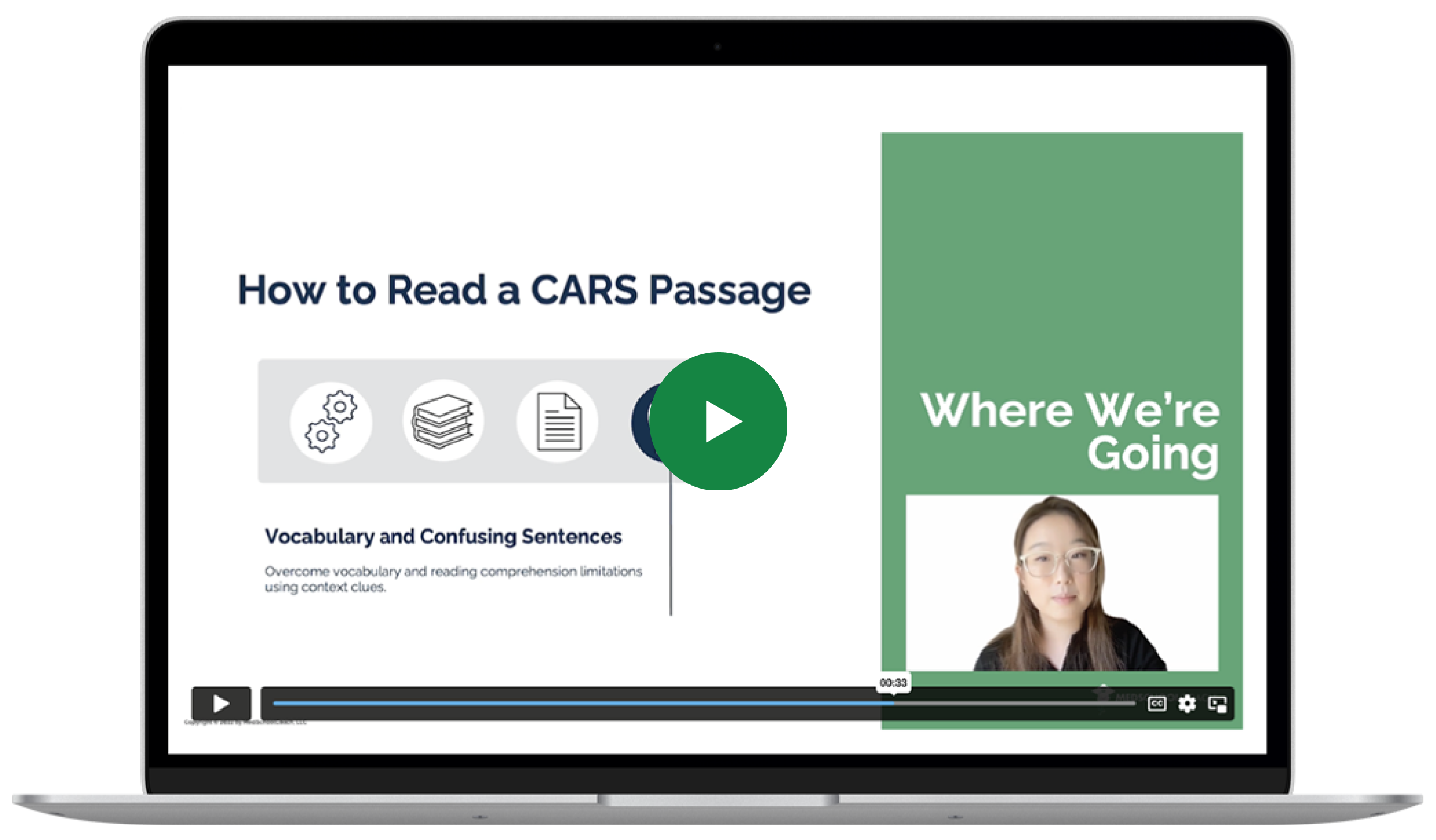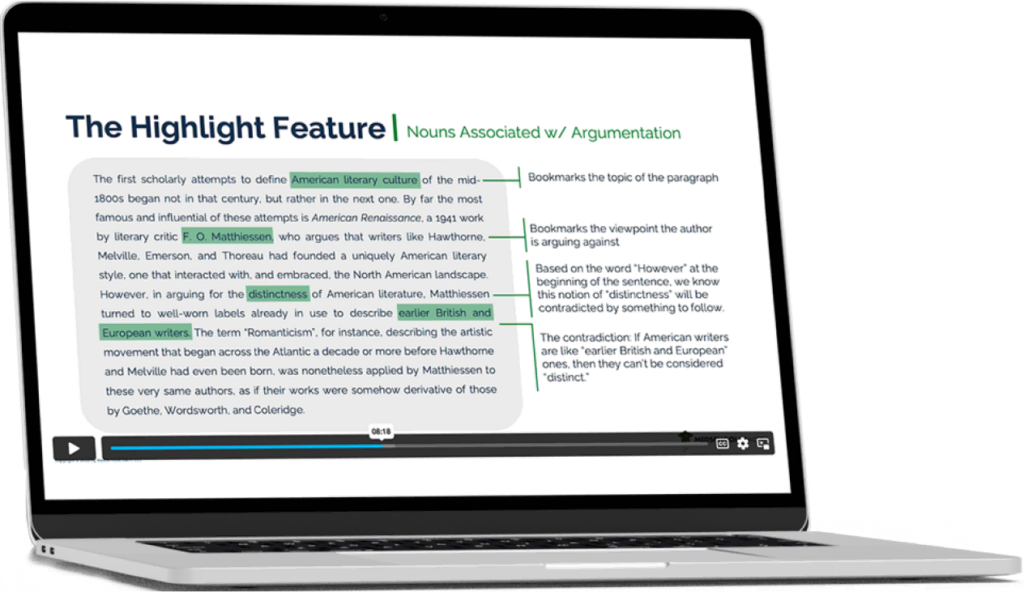
More Knowledge =
Less Studying + a Higher Score.
Crack the CARS Code
Outmaneuver the AAMC
Smash Score Plateaus
Perform Under Pressure
What's Included in CARS Mastery...
Guided-learning questions designed to reinforce key CARS skills and ensure your understanding.
Expert-developed, score-maximizing videos that deliver crucial strategies for success.
Easy-to-digest lessons, putting CARS mastery within your reach.
Check Out Our Sample Lecture Videos


Overview of Lessons
Lesson 1: How to Read a CARS Passage
Lesson 1 will introduce you to the basic elements of CARS passages, including the main idea, the author’s tone, and the various perspectives and viewpoints embedded in the text. We’ll then show you how to identify those elements by paying attention to word choice and context clues. This lesson will also teach you to decipher difficult vocab words and parse long-winded, confusing sentences (both of which feature heavily in CARS passages, unfortunately).
You’ll learn to drill deeper into CARS passages to expose the fundamental structure that undergirds them. It turns out that beneath their more obvious characteristics, every CARS passage consists of fundamental units called claims. These in turn combine to form more complicated rhetorical structures, such as viewpoints and arguments. In this lesson, you’ll learn how to analyze CARS passages in terms of their constitutive claims. This, as you’ll see, will allow you to better interpret the passage’s meaning. It will also set you up to succeed with certain CARS questions, specifically those which deal with support, evidence, and plausibility.
Lesson 2: CARS Question Types
Lesson 2 provides an in-depth examination of the three CARS question types: Foundations of Comprehension questions, Reasoning Within the Text questions, and Reasoning Beyond the Text questions. These three question types each test different reading and reasoning skills, and by becoming familiar with these skills, you’ll gain a better understanding of what you need to work on to improve your score. To help you in this endeavor, this lesson will also give you some concrete tips on how to succeed with the different question types.
Lesson 3: How to Answer CARS Questions
In Lesson 3, we’ll introduce the concept of the OODA loop, a decision-making framework originally developed by US Air Force Colonel John Boyd for use in military combat. Since then, the OODA loop has been applied to other high-stakes activities, like business and nursing, and we’ll show you how it can also be applied to answering CARS questions. The advantage of the OODA loop, as we’ll point out, is that it gives you a solid framework for acting under stress without being overly rigid or constraining.
Lesson 4: CARS Answer Choices
In Lesson 4, we’ll discuss the recurring characteristics of both correct and incorrect CARS answer choices. The goal here is to develop a mental “drop-down” list of reasons why an answer choice might be right or wrong. With this done, your process of elimination will become much more efficient and effective, as you’ll be able to pinpoint the exact reason why a certain answer choice does or doesn’t fit. This lesson will also discuss what makes certain incorrect answers attractive or tempting. With this knowledge in your back pocket, you’ll be less likely to fall for a trap answer choices.
Lesson 5: How To Improve When You’re Stuck
Lesson 5 recaps the major themes of the course, including the fact that the CARS section displays repeated, predictable patterns, as well as the idea of CARS as a learnable skill. These insights will empower you to take control of your studying and become an elite CARS performer. This lesson will also share tactics for Test Day itself, including how to cultivate the right mindset for success, as well as more nitty-gritty tips like what snacks you should pack and how to best utilize the breaks between sections.
The story behind our CARS course…
Some time ago, our team of 99th-percentile MCAT experts set themselves a goal: to devise the simplest, most effective CARS how-to guide on the market. After months of thinking, planning, and pouring over official AAMC exams, here are the results: an all-in-one, asynchronous course that delivers CARS expertise without any fluff, so that you can maximize your score as quickly as possible.
Underlying our work is a single guiding principle: that more practice and more studying does NOT always translate into more results. It turns out that the secret of CARS success is not hard work and long hours, but rather knowledge – knowledge of how the CARS section is written, what skills it’s testing, and how to study smarter rather than harder. So you can skip the endless practice passages, the tedious question banks, and the stubborn low scores. Our course gives you the know-how to achieve superior results in half the time – it’s your shortcut to CARS success.

Owen Ezell
MCAT CARS COURSE CO-CREATOR
100th Percentile CARS Scorer

Maddie Jang
MCAT CARS COURSE CO-CREATOR
95th Percentile CARS Scorer
CARS mastery is only a click away...

- 21 lecture videos featuring expert CARS instruction from 99th percentile scorers
- 75 guided-learning questions designed to reinforce crucial score-enhancing skills
- 5 Easy-to-digest lessons, putting CARS mastery within your reach
- 6 month course access
- 7 day money back guarantee
Frequently Asked Questions
The CARS section isn’t about science, it doesn’t test your memory of facts, and it requires a set of skills that many pre-meds are unfamiliar with. The result is that CARS presents a unique challenge, especially for science-oriented minds.
However, although CARS is difficult, it is still learnable. It turns out, for instance, that CARS passages and questions are actually quite formulaic. This means that it is possible to anticipate what CARS will look like on Test Day. Further, while CARS may not test your mastery of facts, it does test your mastery of skills. By practicing those CARS skills, you can improve your score.
Our course can accelerate your learning by showing you how the CARS section is written and by teaching you how to hone your skills. That way, you’ll become an elite CARS scorer without months and months of study.
The only way to get better at CARS is to change how you read passages and answer questions. Using the same strategies won’t produce different results, right?
This explains why doing more and more practice doesn’t always lead to better scores. If your approach to CARS passages and questions is the same every time, it doesn’t matter how much practice you do – you’ll only score as high as your approach allows.
That’s why at MedSchoolCoach we recommend that you review every practice CARS passage that you complete. Reviewing your work is the only way to understand what you’re doing wrong and how you can improve.
Our MCAT CARS Mastery course will teach you the best way to extract insights from your past performance and then apply those insights to your next practice set. This cycle of practice-review-practice-review is the real key to lasting score improvements.
At bottom, CARS is a verbal reasoning test. It’s different from the other science-focused sections of the MCAT, and it’s not uncommon for pre-med students to score well in these sections but badly in CARS.
Scoring well in three out of four sections may seem acceptable, but in the eyes of admissions committees, it is not. The fact is that medical school admissions is growing more competitive by the year. Recently, there was a stark increase in the number of rejected applicants. We don’t mean to scare you but merely remind you that admissions committees are looking for flaws in your application. An unsatisfactory CARS score could absolutely be a deal breaker.
With this in mind, buying a CARS study resource may be a worthwhile investment. If our $399 CARS course helps you improve your score, which helps you get accepted, then that $399 will – simply put – be the best money you ever spent.
The MCAT CARS Mastery course features 120 guided-learning questions. However, these questions are not CARS questions and are not intended to replicate the actual MCAT. Instead, their purpose is to reinforce the skills and strategies that we teach in this course. Some of these questions are associated with a passage, just as in the actual CARS section. However, you will quickly see that their style and format does not mimic AAMC CARS questions.
If you want more practice material, beyond what is offered by the AAMC, consider purchasing a MedSchoolCoach MCAT practice exam. Ours are the most realistic third-party MCAT exams on the market and replicate the AAMC with regard to content, difficulty, and user interface.